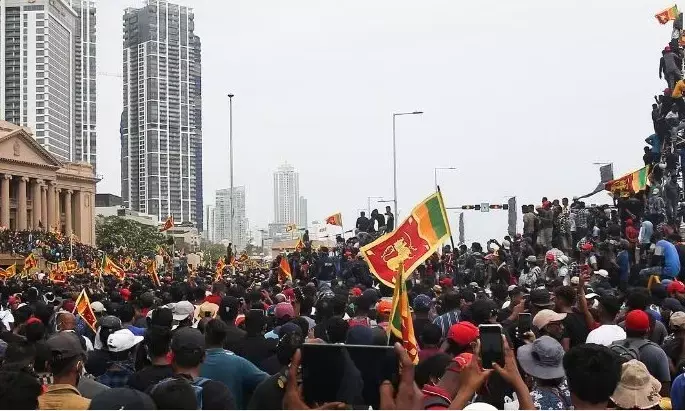UNHCR to Sri Lanka -Economic Crisis Result of Human Rights Violations
Deeper reforms and accountability required

In her report on Sri Lanka to the September 2022 session of the UN Human Rights Council (UNHRC) on Wednesday, the High Commissioner of Human Rights (HCHR) said that the present economic crisis the island nation is going through, could be traced to a long history of human rights violations by the State.
Adoption of deeper reforms and accountability will give the Lankan government an opportunity to make all-round gains in the future, the report said.
Sri Lanka's new Government should embark on a national dialogue to advance human rights and reconciliation, the report said as it called for accountability and deeper institutional reforms to prevent a recurrence of past violations.
The report acknowledges that Sri Lanka is at critical juncture in its political life, and is in the midst of a serious economic crisis which has severely impacted the human rights of all communities and people of all walks of life. This has spurred broad-based demands by Sri Lankans from all communities for deeper reforms and accountability, and gives the government a fresh opportunity to steer the country on a new path.
For sustainable improvements to take place, however, it is vital to recognize and address the underlying factors which have contributed to the economic crisis, including embedded impunity for past and present human rights violations, economic crimes and endemic corruption, the report said.
"Fundamental changes will be required to address the current challenges and to avoid repetition of the human rights violations of the past," it adds.
The report calls on the government to immediately end the reliance on draconian security laws and crackdowns on peaceful protest, reverse the drift towards militarization and show renewed commitment to, and deliver on, security sector reform and ending impunity.
While the security forces recently showed considerable restraint in response to mass protests, the government has since taken a harder line, arresting some student leaders under the Prevention of Terrorism Act and violently suppressing peaceful protests.
A heavily militarized environment and culture of surveillance continues in the north and east of the country, the reported added.
It urges the new government to re-launch a comprehensive and victim-centered strategy on transitional justice and accountability, with a time-bound plan to implement outstanding commitments, including taking steps in relation to the establishment of a credible Truth-Seeking Mechanism and an ad hoc special court. Victims must be given a central role in the design and implementation of all accountability and transitional justice mechanisms.
Expressing concern about the lack of progress to establish the truth about the Easter Sunday bombings in 2019, the report calls for a follow-up independent and transparent investigation, with international assistance and the full participation of victims and their representatives, to pursue further lines of inquiry.
"The Sri Lankan State, including through successive governments, has consistently failed to pursue an effective transitional justice process to hold perpetrators of gross human rights violations and abuses accountable and uphold victims' rights to truth, justice and reparations," the report states.
"Rather, they have created political obstacles to accountability, and actively promoted and incorporated some military officials credibly implicated in alleged war crimes into the highest levels of government."
In the absence of progress towards accountability at the national level, the report urges other States to cooperate in accountability efforts, including by using available avenues of extraterritorial and universal jurisdiction, to investigate and prosecute crimes under international law committed in Sri Lanka.
Additionally, the report urges States to explore further measures targeting those who are credibly alleged to have been responsible for gross violations and abuses of international human rights law or serious violations of international humanitarian law.
The report outlines the progress of the OHCHR work on accountability, pursuant to Council resolution 46/1, and calls for reinforcement of its capacity.
Sri Lanka is yet to formally address the council, but in its defense, the government is expected to point out that despite the pandemic and the economic crisis that followed, it has taken some measures to ensure accountability. It had set up an Office of Missing Persons and an of Office of Reparations. A National Security Act, which would be in keeping with international norms and present-day needs, is to replace the Prevention of Terrorism Act.
President Ranil Wickremesinghe announced on Wednesday that a Truth and Reconciliation Commission is to be set up. The government had earlier de-listed six organizations and over 300 individuals who were allegedly linked to the now defunct Liberation Tigers of Tamil Eelam (LTTE). And Office to liaise with the Tamil Diaspora is to be set up.
In a break from the past, the High Commissioner of Human Rights has not asked for a judicial mechanism with foreign judges and investigators. The Lankan Foreign Minister, Ali Sabry had earlier reiterated the government's stand that the Lankan constitution does not give room for a judicial mechanism with foreign participation. Sri Lanka would also not accept universal jurisdiction over its personnel.



